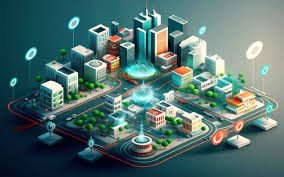The Rise of Smart Cities: Innovating Urban Living
In today’s rapidly evolving world, the concept of smart cities is gaining momentum as urban areas seek innovative solutions to address the challenges of modern living. A smart city harnesses technology and data to improve infrastructure, enhance sustainability, and create a better quality of life for its residents.
One key aspect of a smart city is the integration of information and communication technologies (ICT) to optimise various services and systems. This includes implementing smart transportation systems to reduce traffic congestion, improve public transportation, and enhance overall mobility within the city.
Smart cities also focus on sustainability by incorporating renewable energy sources, efficient waste management systems, and green spaces to promote environmental well-being. By leveraging data analytics and IoT devices, these cities can monitor energy consumption, reduce carbon emissions, and enhance overall resource efficiency.
Furthermore, smart cities prioritise citizen engagement through digital platforms that enable residents to provide feedback, access services online, and participate in decision-making processes. This fosters a sense of community empowerment and ensures that urban planning initiatives are aligned with the needs and preferences of the population.
As the world becomes increasingly interconnected, the potential benefits of smart cities are becoming more apparent. From improved public safety through advanced surveillance systems to enhanced healthcare services through telemedicine platforms, the possibilities for innovation in urban living are endless.
While challenges such as data privacy concerns and digital divide issues must be addressed, the overall trajectory towards smarter cities signifies a positive shift towards a more sustainable and efficient future for urban environments worldwide.
In conclusion, the rise of smart cities represents a paradigm shift in how we approach urban development. By embracing technology and innovation, cities can become more resilient, liveable, and responsive to the needs of their inhabitants. As we continue to progress towards a more connected world, smart cities offer a glimpse into what the future of urban living may hold – one that is intelligent, sustainable, and inclusive for all.
6 Tips for Smarter City Living: Sustainable Choices for Urban Dwellers
- Use public transport to reduce traffic congestion.
- Invest in a reusable water bottle to cut down on plastic waste.
- Explore local markets and support small businesses.
- Take advantage of bike-sharing schemes for short trips.
- Reduce energy consumption by using LED bulbs and turning off appliances when not in use.
- Get involved in community clean-up events to help keep the city clean and green.
Use public transport to reduce traffic congestion.
Utilising public transport is a key strategy in the realm of smart cities to alleviate traffic congestion and promote sustainable urban mobility. By opting for buses, trains, or trams instead of individual vehicles, residents can help reduce the number of cars on the road, thereby easing congestion and lowering carbon emissions. Embracing public transport not only contributes to a smoother flow of traffic but also fosters a more environmentally friendly and efficient transportation system within cities.
Invest in a reusable water bottle to cut down on plastic waste.
Investing in a reusable water bottle is a simple yet impactful step towards building a smarter city. By opting for a reusable alternative instead of single-use plastic bottles, individuals can significantly reduce their contribution to plastic waste in urban environments. This small change not only promotes sustainability but also encourages a culture of environmental consciousness among city residents, ultimately leading to a cleaner and more eco-friendly urban landscape for all to enjoy.
Explore local markets and support small businesses.
Exploring local markets and supporting small businesses is a key tip for fostering a smart city environment. By shopping locally, residents not only contribute to the economic vitality of their community but also help reduce carbon emissions associated with transportation of goods. Additionally, supporting small businesses promotes diversity and innovation in the urban landscape, enriching the city’s cultural fabric and creating a more vibrant and sustainable local economy.
Take advantage of bike-sharing schemes for short trips.
City smart tip: Taking advantage of bike-sharing schemes for short trips is a convenient and eco-friendly way to navigate urban areas. By opting for a bike instead of a car or public transport for short distances, you not only reduce your carbon footprint but also promote personal health and well-being through physical activity. Bike-sharing schemes offer a cost-effective and efficient alternative that contributes to alleviating traffic congestion and promoting sustainable mobility in cities. Embracing this option aligns with the ethos of smart cities by encouraging environmentally conscious transportation choices that benefit both individuals and the urban environment as a whole.
Reduce energy consumption by using LED bulbs and turning off appliances when not in use.
By implementing simple yet effective strategies such as switching to energy-efficient LED bulbs and conscientiously turning off appliances when not in use, cities can significantly reduce energy consumption and contribute towards building a more sustainable and environmentally-friendly urban landscape. These small changes in daily habits can lead to substantial energy savings, lower utility costs, and ultimately pave the way for a smarter and greener future for our cities.
Get involved in community clean-up events to help keep the city clean and green.
Getting involved in community clean-up events is a proactive way to contribute to the well-being of our city and promote a clean, green environment for all residents. By participating in these initiatives, we not only beautify our surroundings but also foster a sense of community pride and unity. Taking part in clean-up events demonstrates our commitment to sustainable living and inspires others to do their part in preserving the natural beauty of our city for future generations to enjoy.
